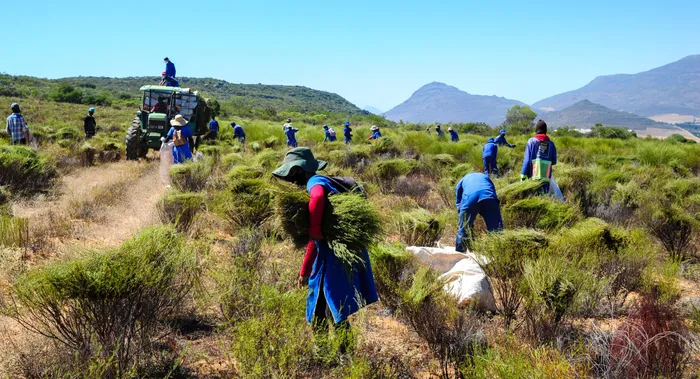Farmworkers still treated ‘atrociously’ in SA

President Cyril Ramaphosa reminded his supporters about the dreadful act of farm evictions that farmworkers continued to be subjected to after 30 years of democracy. Picture: Henk Kruger/Independent Newspapers
Cape Town - As South Africa celebrates Workers' Month, farmworkers are still faced with harsh working conditions, farm evictions, victimisation, and exploitation, 30 years into democracy, something that political parties have strongly condemned.
In his address on Workers' Day in Cape Town, President Cyril Ramaphosa reminded his supporters about the dreadful act of farm evictions that farmworkers continued to be subjected to after 30 years of democracy.
“We want farm evictions to come to an end. We still need to return the land to those who work it,” said Ramaphosa.
Reflecting on Workers' Day 30 years into democracy, EFF Western Cape spokesperson Wandile Kabisi said nothing had changed for the farmworkers “as they are still being subjected to all forms of exploitation, victimisation, and evictions by greedy and racist white farmers”.
“Farmworkers are evicted on a daily basis from farms they were born and grew up on, and this inhumane treatment of farmworkers is prevalent here in the Western Cape. White farmers treat black farmworkers like dirt, paying them less than the minimum wage, and some of these farmworkers don't even get their leave days.
“We still get cases of white farmers who violate the constitutional rights of farmworkers by threatening them to vote in a particular way. None of this will happen under the EFF-led government,” said Kabisi.
Billy Claasen, People's Movement for Change's (PMC) head of agriculture, rural development, and farmworkers, said they had always maintained that farmworkers were the poorest, most marginalised, and at-risk workers.
He said their working and living conditions were atrocious at times.
“As an activist for the most destitute, I have always believed that the ANC government will do something better for the lives of farmworkers. However, today, 30 years into democracy, nothing has really changed on farms or in the life of a farmworker. There is nothing for them to be proud of in today's life,” said Claasen.
“Today, farmworkers can rightfully ask, ‘South Africa, where is our freedom?' Farmworkers are still cuffed in chains of oppression. They are still used as BEE scams by big agricultural corporations, farmers, and greedy politicians. They have nothing to show or to benefit from in this beautiful country.”
Western Cape deputy director-general, agricultural development and support services, Darryl Jacobs, said based on feedback and engagements with beneficiaries of projects implemented by the Department of Agriculture, they were able to confirm a relative improvement in the lives of agri-workers.
“The department implemented several projects geared towards the social upliftment and capacitation of agri-workers. All projects were strategically developed based on the findings of the AgriWorker Household Census, other primary information sources, and reports received from the Western Cape Prestige Agriworker Forum that advises the Minister of Agriculture quarterly on pertinent issues on farms,” said Jacobs.
However, farmworkers activist, Alvina Abrahams, disputed Jacobs's claims, saying nothing has changed for farmworkers in the province.
“Unfair labour practices are still there, and they are still busy with unfair labour practices from the farmers.
“Last month, farmworkers at a certain farm complained they were not paid out on a public holiday, although they had worked that day. Farmers continue to create their laws to mistreat farmworkers. Farmworkers continue to face challenges. There are a number of eviction cases I am busy with,” said Abrahams.
Related Topics: